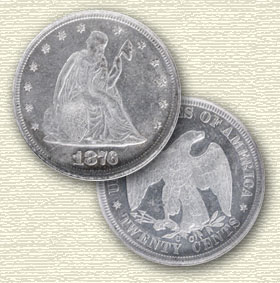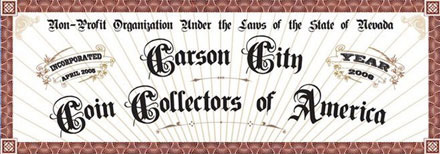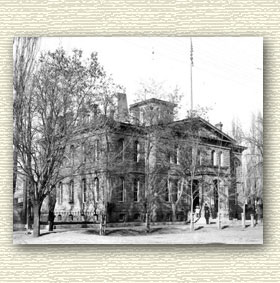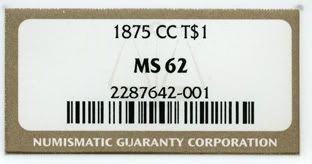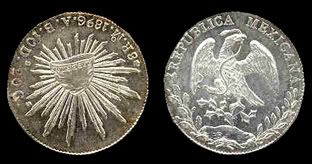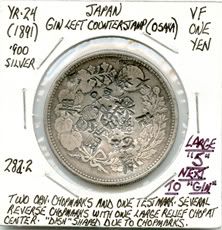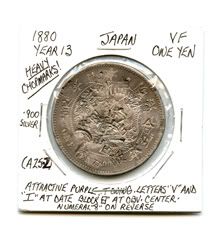- Thank you received: 0
1875-CC Trade Dollar November 7th Coin of the Week
14 years 7 months ago - 14 years 7 months ago #1629
by LITAS
Ideally it would be nice to find and to afford to buy coins that look like the image shown above.
At present I am happy to own MS-62 1875-CC Trade Dollar.
The United States Congress authorized the U.S. Mint to create a trade dollar in order to improve the trade with the Orient, China in particular. Prior to that, the Mexican peso had been the primary silver coin used in trading with China. In fact, the eagle on the trade dollar's reverse looks quite similar to the peso's.
The coin was designed by William Barber and was issued from 1873 to 1885. Business strikes ended in 1878. More trade dollars were minted in San Francisco than Carson City and Philadelphia combined.
Philadelphia (1875) mintage: 218,200
San Francisco (1875-S) mintage: 4,487,000
Carson City (1875-CC) mintage: 1,573,000
The 1875-CC trade dollar was produced in larger numbers than any other trade dollar from the Carson City Mint. This makes 1875-CC trade dollar the most available Carson City trade dollar, although in MS-64 or better grade it is a great rarity.
The 1875-CC trade dollar maybe is common among other Carson City trade dollars, however in absolute terms the coin is hardly common. For example, MS-60 1875-CC trade dollar is rarer than Proof 1895 Morgan dollar.
At least 18 pairs of Obverse and Reverse dies were shipped to the Carson City Mint in 1874. For some reason, two Carson City reverse dies, with tall CC letters, were shipped to San Francisco were CC mintmark was partially effaced and overpunched with an S mintmark. 1875-S/CC trade dollars are claimed by collectors of sets from both mints.
In China the American trade dollar competed well with the Mexican trade bdollar and almost drove it out of the Chinese market, but what becomes of the American trade dollar is another interesting story. The Chinese send it to India for the purchase of opium. In India the trade dollars go to the Calcutta Mint and come out as rupees. The American Journal of Numismatics, January, 1876, printed that the amount of American silver which annually goes to India from China to pay for the opium is immense. What a horrible fate for such a beautiful coin.
As the United States trade dollar became accepted in China, other governments came up with their own ideas to coin a copycat version of the United Staes trade dollar.
Trade dollar of Japan.
Trade dollar of Britain.
Trade dollar of France.
An interesting historical footnote to the trade dollar series is the presence of punched insignias, called "chop marks". These marks were created to test the authenticity of a coin. Some of these marks are fascinating and chopped marked coins can bring a premium. "I was there" chop marks are another characteristic that makes collecting trade dollars unique and intriguing hobby.
Believe it or not, there is a special group of numismatists, that formed a "Chopmark Collector's Club". They publish a newsletter "Chopmark News" and run "Chopmark Coin Collection Auction". E-mail: chopmarks@verizon.net
In the United States the value of trade dollar varied from $1.05 to $0.85 depending on the price of silver. By early 1875 more trade dollars were being dumped in the U.S. than sent to China, since China could not absorb all that silver. The Congress was flooded with the demands to end the coinage of the trade dollars. The making of trade dollars for circulation ceased in 1878.
Present PCGS prices are as follows,
1875-CC AU-55 $1,100
1875-CC MS-60 $2,500
1875-CC MS-62 $3,250
1875-CC MS-64 $13,500
1875-S/CC AU-55 $1,750
1875-S/CC MS-60 $4,000
1875-S/CC MS-62 $7,500
1875-S/CC MS-64 $28,500
Be careful when buying trade dollars. The market place is full of counterfeits many of which were made in China. The best way to protect youself is to purchase only examples that have been graded by PCGS, NGC or ANACS or at least being sold by a reputable dealer.
John Armonas
1875-CC Trade Dollar November 7th Coin of the Week was created by LITAS
Ideally it would be nice to find and to afford to buy coins that look like the image shown above.
At present I am happy to own MS-62 1875-CC Trade Dollar.
The United States Congress authorized the U.S. Mint to create a trade dollar in order to improve the trade with the Orient, China in particular. Prior to that, the Mexican peso had been the primary silver coin used in trading with China. In fact, the eagle on the trade dollar's reverse looks quite similar to the peso's.
The coin was designed by William Barber and was issued from 1873 to 1885. Business strikes ended in 1878. More trade dollars were minted in San Francisco than Carson City and Philadelphia combined.
Philadelphia (1875) mintage: 218,200
San Francisco (1875-S) mintage: 4,487,000
Carson City (1875-CC) mintage: 1,573,000
The 1875-CC trade dollar was produced in larger numbers than any other trade dollar from the Carson City Mint. This makes 1875-CC trade dollar the most available Carson City trade dollar, although in MS-64 or better grade it is a great rarity.
The 1875-CC trade dollar maybe is common among other Carson City trade dollars, however in absolute terms the coin is hardly common. For example, MS-60 1875-CC trade dollar is rarer than Proof 1895 Morgan dollar.
At least 18 pairs of Obverse and Reverse dies were shipped to the Carson City Mint in 1874. For some reason, two Carson City reverse dies, with tall CC letters, were shipped to San Francisco were CC mintmark was partially effaced and overpunched with an S mintmark. 1875-S/CC trade dollars are claimed by collectors of sets from both mints.
In China the American trade dollar competed well with the Mexican trade bdollar and almost drove it out of the Chinese market, but what becomes of the American trade dollar is another interesting story. The Chinese send it to India for the purchase of opium. In India the trade dollars go to the Calcutta Mint and come out as rupees. The American Journal of Numismatics, January, 1876, printed that the amount of American silver which annually goes to India from China to pay for the opium is immense. What a horrible fate for such a beautiful coin.
As the United States trade dollar became accepted in China, other governments came up with their own ideas to coin a copycat version of the United Staes trade dollar.
Trade dollar of Japan.
Trade dollar of Britain.
Trade dollar of France.
An interesting historical footnote to the trade dollar series is the presence of punched insignias, called "chop marks". These marks were created to test the authenticity of a coin. Some of these marks are fascinating and chopped marked coins can bring a premium. "I was there" chop marks are another characteristic that makes collecting trade dollars unique and intriguing hobby.
Believe it or not, there is a special group of numismatists, that formed a "Chopmark Collector's Club". They publish a newsletter "Chopmark News" and run "Chopmark Coin Collection Auction". E-mail: chopmarks@verizon.net
In the United States the value of trade dollar varied from $1.05 to $0.85 depending on the price of silver. By early 1875 more trade dollars were being dumped in the U.S. than sent to China, since China could not absorb all that silver. The Congress was flooded with the demands to end the coinage of the trade dollars. The making of trade dollars for circulation ceased in 1878.
Present PCGS prices are as follows,
1875-CC AU-55 $1,100
1875-CC MS-60 $2,500
1875-CC MS-62 $3,250
1875-CC MS-64 $13,500
1875-S/CC AU-55 $1,750
1875-S/CC MS-60 $4,000
1875-S/CC MS-62 $7,500
1875-S/CC MS-64 $28,500
Be careful when buying trade dollars. The market place is full of counterfeits many of which were made in China. The best way to protect youself is to purchase only examples that have been graded by PCGS, NGC or ANACS or at least being sold by a reputable dealer.
John Armonas
Last edit: 14 years 7 months ago by LITAS.
Please Log in to join the conversation.
- Loosechange
- Offline
- Platinum Member
-

- Married to my best friend!
Less
More
- Thank you received: 0
14 years 7 months ago #1630
by Loosechange
Go "CC'S"
Replied by Loosechange on topic Re:1875-CC Trade Dollar November 7th Coin of the Week
Super article John! I have learned so much from this forum. All the years that I collected 8 Reales Mexican coins I failed to put two and two together for their use of trade in the Orient. Nice MS62 coin you have there also. As I stated in last weeks COW I have yet to get myself a CC Trade Dollars. I am still hunting though.
Loosechange
Loosechange
Go "CC'S"
Please Log in to join the conversation.
14 years 7 months ago #1631
by LITAS
Replied by LITAS on topic Re:1875-CC Trade Dollar November 7th Coin of the Week
Loosechange,
I am glad you decided to join COW postings. It's the research that makes it fun. For example, I had no idea that many trade dollars were melted in India until I started digging for this posting.
Also it is fun to have the actual coin. Since I cannot afford the million dollar examples, sometimes I just buy a low grade coin. Having a coin makes me more interested to find out more about it.
If the interest persists then I try to upgrade to a better one.
Hope to see many more of your postings.
Thanks.
John Armonas
I am glad you decided to join COW postings. It's the research that makes it fun. For example, I had no idea that many trade dollars were melted in India until I started digging for this posting.
Also it is fun to have the actual coin. Since I cannot afford the million dollar examples, sometimes I just buy a low grade coin. Having a coin makes me more interested to find out more about it.
If the interest persists then I try to upgrade to a better one.
Hope to see many more of your postings.
Thanks.
John Armonas
Please Log in to join the conversation.
14 years 7 months ago #1632
by Carsonite
C4OA Lifer!
Replied by Carsonite on topic Re:1875-CC Trade Dollar November 7th Coin of the Week
John,
You did a good job tying together many points about Trade dollars and the era in which they were made.
In writing about chopmarked Trade dollars, we must pay tribute to C4OA member James Sneddon, who has written much on the subject in Curry's Chronicle articles. Unfortunately, Mr. Sneddon doesn't own a computer, so he can't participate on this Web site's discussion board.
Rusty
You did a good job tying together many points about Trade dollars and the era in which they were made.
In writing about chopmarked Trade dollars, we must pay tribute to C4OA member James Sneddon, who has written much on the subject in Curry's Chronicle articles. Unfortunately, Mr. Sneddon doesn't own a computer, so he can't participate on this Web site's discussion board.
Rusty
C4OA Lifer!
Please Log in to join the conversation.
14 years 7 months ago #1633
by Belayoff
C4OA Lifer!
Replied by Belayoff on topic Re:1875-CC Trade Dollar November 7th Coin of the Week
John
Terrific article. Learned a lot and enjoyed the comparisons to other trade dollars.
As you said, it would be nice to be able to acquire Carson City Trade Dollar specimens like the one at the top of your article.
Belay Off
Terrific article. Learned a lot and enjoyed the comparisons to other trade dollars.
As you said, it would be nice to be able to acquire Carson City Trade Dollar specimens like the one at the top of your article.
Belay Off
C4OA Lifer!
Please Log in to join the conversation.
14 years 6 months ago #1681
by LITAS
Replied by LITAS on topic Re:1875-CC Trade Dollar November 7th Coin of the Week
Please Log in to join the conversation.
Time to create page: 0.089 seconds
